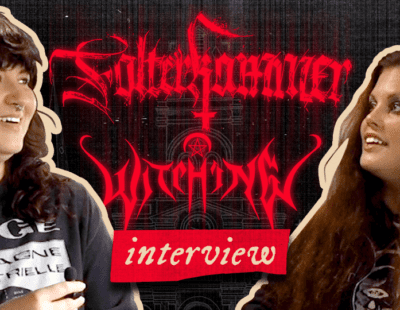
I’ve been walking over and over a question in my mind for a few weeks now. I’m stuck on it. Here’s how I got there: My favorite genre of music is, obviously, heavy metal in all, well, most, of its forms. I am writing at this site, after all. But metal isn’t all that I listen to, and I’ve often been asked the question “What do you like besides metal?” In fact, I’ve been asked that question enough times that not only do I know the answer—hip hop—but I’ve got a pretty rote explanation drilled into my head about how it was I came to love those two kinds of music and what they have in common. Working class origins. Aggressive lyrics. Evocative storytelling. Yadda yadda.
But every so often I get the question a second time. “What do you like besides metal and hip-hop”. It’s worth pointing out that the person who asks this question is invariably a totally insufferable human who isn’t really looking for a good answer, doesn’t care what my real answer is, and just wants to talk about, I don’t know, Florida Georgia Line or something.
Even so.
I get stuck on that question because the answer I usually get is a far less articulate “I don’t know… Eighties… stuff?” Post-punk. Synthpop. New Wave. You get the drill. These are all distinct kinds of music that I’m horribly scrambling, but for the purposes of this article, they constitute a cloud of material that all encapsulates one place in pop culture. There’s a common ground between that stuff and metal too—I really only like the one or two things in music and I just want different flavors of it, in my heart, I know this somehow—but I have no rote, concise answer for what it is.
I’m not alone in my enamoration with the metal-post punk bridge. Not only are there a lot of ‘metal’ bands who basically sound exactly like eighties throwbacks, but there’s a long history of metal bands covering that stuff. Fear Factor and Queensryche have both covered U2. In Flames have now covered Depeche Mode twice. Arsis covered “Sunglasses at Night.” Converge covered The Cure. so many bands have covered Joy Division that I can’t list them all. This isn’t a new phenomenon, either. Warfare covered “Two Tribes” by Frankie Goes to Hollywood when it was a brand new song. So, what gives?
Enter Jason Corbett, singer and guitarist of Vancouver outfit Actors, whose new album It will Come to You will be released on March 9. Loosely, the band plays eighties-style post-punk, but Corbett is a vocal metalhead, someone who dabbles in the same connective tissue between the two genres that I do. I spoke with Corbett about his influences, and how he parses out the common ground between heavy metal and post-punk.
So, for you which came first, post-punk or heavy metal, and how did you find yourself getting into those genres?
It feels almost cyclical. I was a child of the 80’s. At a young age, I was exposed to the “post” punk that seemed to have morphed into the synth-infused pop music that was happening at the time. Music like Bowie’s , The Cure, and even Gary Numan had a lasting impression on me. As I hit my teens learning to play guitar, I became obsessed with metal. Bands like Metallica and Slayer were my gateway. The post-punk influenced music I do now with ACTORS happened very naturally. That led me to rediscover artists from the past and current artists that would fall under the umbrella of post-punk.
I know you’re specifically a fan of the Roadrunner Records catalog from the early 90’s. That’s a pretty important crop of records and bands. I’m especially thinking Sepultura’s golden period, but also maybe Type O Negative, who was not a death metal band put probably introduced a ton of kids to “goth” aesthetics and vocabulary. What are the highlights here for you, and why?
I loved a lot of artists on Roadrunner like Obituary, Fear Factory, Nailbomb, etc. but my tastes were all over. I think with most bands, what I really got off on were the rhythms. Bands like Godflesh and Helmet are two big ones for me. To be honest I never really got into Type O Negative at the time, maybe it’s time to revisit.
Nailbomb’s sort of coming back. Max is finally playing those songs live with Soulfly. You gonna try to catch that?
I would love to see that. I have to pick and choose where I can spend my leisure time as I’m at the studio working with artists almost daily. Then there’s my ACTORS schedule. But this would be worth it.
For me, heavy metal led me into post-punk or I guess what you’d call ‘goth’ music. I distinctly remember loving Kreator’s rendition of “Lucretia” by The Sisters of Mercy and following that Wikipedia thread into becoming a huge fan of that band. It seems to me that Sisters, in particular, have a strong appeal to metalheads, what do you think?
They are one of those bands that has an appeal. They wrote some fantastic music and they looked the part. It makes sense.
Are there any other bands which seem to have any particular appeal to metalheads? I recall on a recent NPR piece the members of Depeche Mode said they have a big contingent of metal fans.
Depeche Mode was a band I always loved. Violator is a masterpiece. I can totally understand that. I think The Cure would be another. A band that straddles both worlds effortlessly is Killing Joke. From their debut album tracks being covered by Helmet and Metallica to their synth flavored 80’s album Night Time, they strike an ever-evolving balance. I think good music is good music. And if there’s a common darkness in the tonality, then it’s an easy jump.
It’s funny you mention Killing Joke – I just wrote a list of metal comeback albums that listed their 2003 album. I almost didn’t include it because they weren’t ‘metal’ enough but I think they fit. To me, they straddle the metal-punk-rock and roll dividing line perfectly. Maybe the only other band that can do that is Motorhead. Both bands Metallica has covered, both bands that never got bad. How did you get into Killing Joke, and do you still follow their new stuff?
There was a song I wrote and recorded in the early 00’s that a friend told me sounded like Killing Joke. I had heard of them through covers but hadn’t really paid enough attention to give them a real listen. I bought their first and second record at a used record store for next to nothing and was totally blown away. Then the 2003 album came out! Coincidentally the producer of that album was Andy Gill from Gang of Four whom I had been talking to roughly a year early about producing my band at the time. Unfortunately, those plans fell through.
If there’s this huge, acknowledged overlap between these two sets of music fandom, what, do you think is the connective tissue between them? Is it lyrical? Aesthetic?
We recently discussed the crossover appeal of the metal and post-punk genres with each other while we were on a 12-hour drive coming home from tour. Jahmeel, our bassist, comes from metal too. We realized there were obvious similarities. There’s an aesthetic they share in uniform and iconography.
There must be a deeper connection besides aesthetics and lyrics, of course. My reasoning this probably comes from the sheer amount of metal acts that have covered post-punk songs. I mentioned “Lucretia” above, but Fear Factory and Queensryche have covered U2, a band mentioned in the PR blast for your new album. More bands have covered Joy Division and New Order (maybe just “Blue Monday” but still) than I can count. What is the musical realm is the overlap between these two styles?
Musically speaking, perhaps the primal drum beats, minor keys, and the raw emotion in the vocal delivery. It speaks to the “outsider” in us.
It speaks to the outsider in us – I like that. That’s a very succinct and accurate way to define their appeal. Were you an outsider when you were young? These kinds of music also seem to get their hooks in us while we’re little.
I don’t think I was what you would have called an outsider. I’m an extrovert, but at the same time, I always felt alone and a bit off on the inside, you know? I started having issues with anxiety at a young age. I like to think that I was ahead of the curve in that regard.
Do you remember the first time music made you feel like you were unlike or apart from other people?
When I first heard Led Zeppelin’s “Black Dog” the hair on my arms stood up and I felt a connection to something bigger than myself. I must have been about 7 or 8. They captured my imagination right then and there and gave me a glimpse into the Ether. Though my musical tastes continue to grow and change over time, I’m still riding that wave.
One of the interesting things about ACTORS, then, is that instead of covering songs in a different style, you’re marrying the influences from metal in the post-punk style. That strikes me as a kind of narrow band of material that might ‘fit’. How do you, personally bridge that gap and figure out, say, what lyric or musical figure might not slot well enough into ACTORS?
I don’t think in terms of genre when I’m writing. ACTORS really has come more from my subconscious and the amalgamation of my influences over the years. I hope people hear that honesty. I don’t want to censor myself. As writers and musicians, we are only a conduit.
The first song on your new record is called “L’Appel du Vide”, which translates to English as “The Call of the Void” and is a reference to the works of existentialist philosopher Sartre. I can see a little common ground with metal there since many metal bands have made open reference to existentialist philosophy in their lyrics and titles. There’s even a band called Call of the Void. This seems to hint to me that beyond aesthetics, ACTORS has some common ground with extreme metal. When it comes to your compositions and writing personally, where do you see the metal influences trickling in?
With titles like “Face Meets Glass,” “Bury Me, Slaves,” “Hit to the Head” etc, I think the metal influence trickles into my lyrics. Dark and bleak imagery but with an element of romanticism. It’s just what comes. The song tells me what it’s about. Sometimes what’s revealed can be a scary thing.
Last question, then, has to be: what has your music revealed that’s scared you. Can you tell me?
Lyrically I can’t always recognize what’s coming out of me at first. I once watched a band cover our song ‘Let It Grow’ and I almost started crying right there in the audience. It was very unnerving to hear my lyrics coming from someone else’s mouth. I didn’t realize the song was about my conflicted emotions about procreation, love, and the societal standards surrounding that. Scary enough for you yet?






